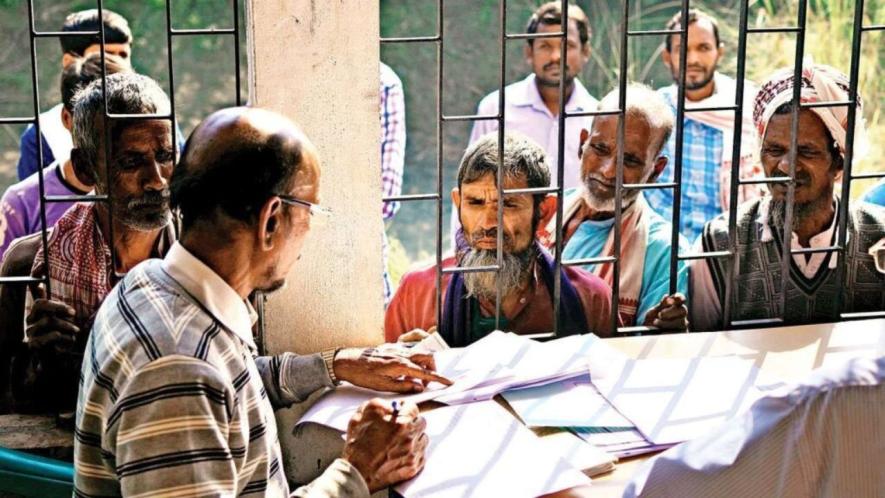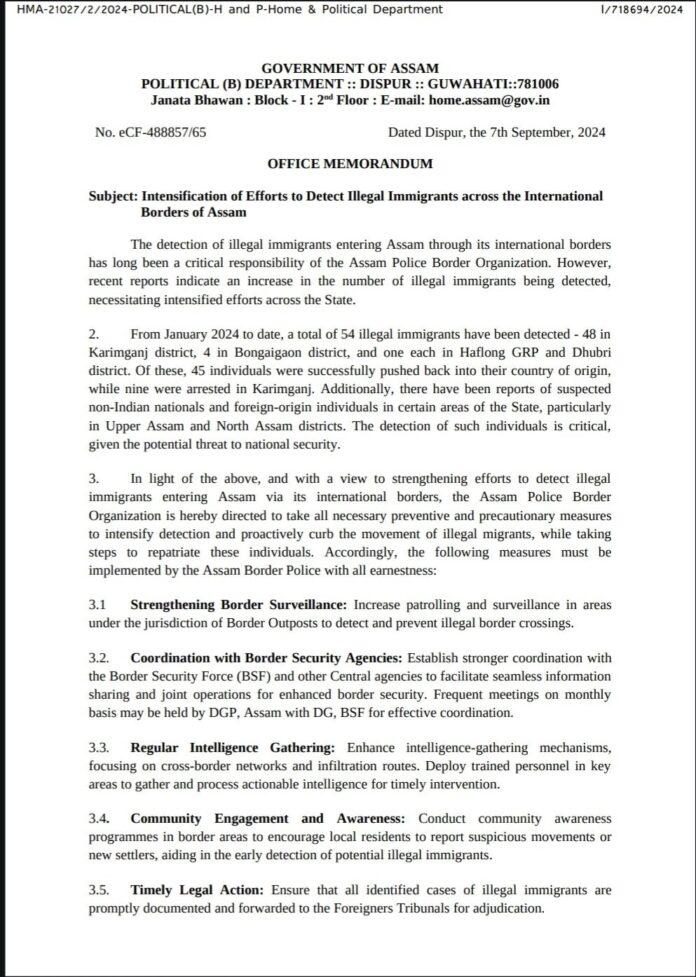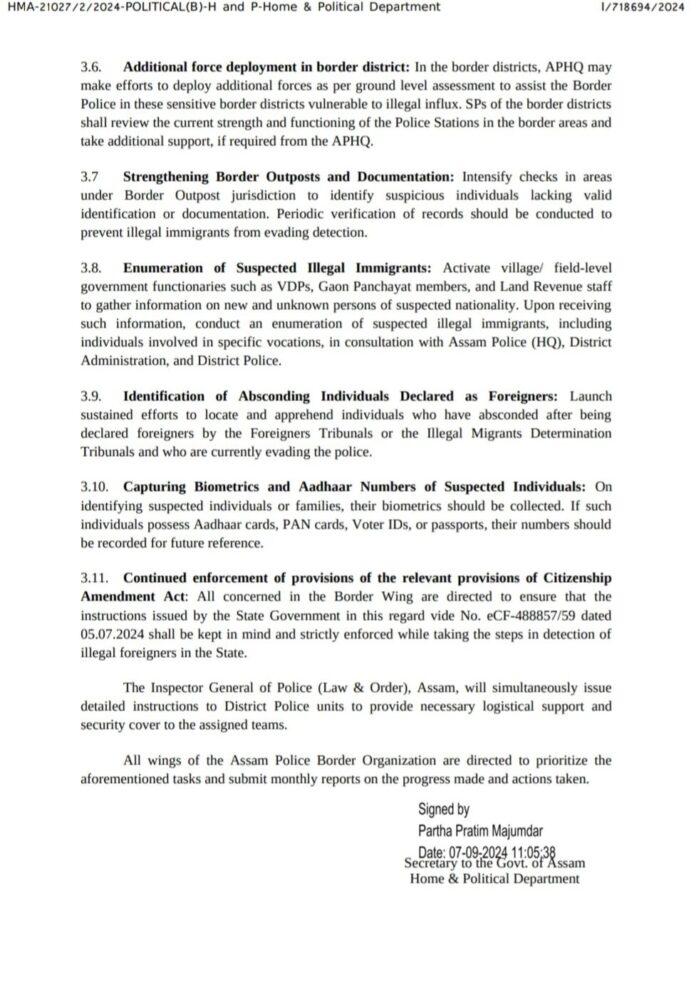Assam Govt.'s Crackdown on 'Foreigners' Sparks Fears of Rights Denial

On September 7, the Assam government issued a “directive to its Border Police” to intensify their drive to apprehend and arrest those individuals that have been declared foreigners by the state’s Foreigners Tribunals. Currently, 100 such Tribunals are operational, and a large number of people have been categorised as illegal immigrants by it.
The office memorandum, issued by the Home and Political Department of Assam, emphasised the need to enhance border security, citing the detection of illegal immigrants as a critical national security issue. According to the memo, 54 individuals have been identified as illegal immigrants since January, with 45 of them deported to their country of origin. The notice stressed the absence of non-Indian origin residents in Assam’s upper and northern districts, framing the detection and removal of such individuals as essential to protecting national interests.
The said memorandum was shared on social media by CM Sarma, along with the caption that “We are intensifying efforts to remove illegal immigrants from Assam. The State Government is initiating a series of coordinated actions that include enhanced surveillance, closer coordination with central agencies, additional deployment of force among others.”
The post may be accessed here:
We are intensifying efforts to remove illegal immigrants from Assam. The State Government is initiating a series of coordinated actions that include enhanced surveillance, closer coordination with central agencies, additional deployment of force among others. @HMOIndia pic.twitter.com/DozR1GwTqJ
— Himanta Biswa Sarma (@himantabiswa) September 7, 2024
Details of the memorandum:
The memorandum lists a total of eleven ways in which the state government plans to detect illegal immigration across the borders, which include increase in border surveillance and patrolling, coordination with Border Security Agencies, and regular intelligence gatherings to find ways to deploy more trained personnel. The memorandum also refers to making efforts to increase community engagement and awareness and taking timely legal action.
Furthermore, the memorandum states that it will strengthen border outposts to identify suspicious individuals lacking valid identification as well as activate village/field-level government functionaries to gather information on new and unknown person of suspected nationality.
It is essential to point out here that the Supreme Court has repeatedly criticised the Assam government for its arbitrary, and often discriminatory practices, in accusing individuals of being foreigners and subjecting them to the arduous process of proving their citizenship. In a significant judgment of July 11, 2024, the bench of Justices Vikram Nath and Ahsanuddin Amanullah had observed that authorities cannot randomly accuse people of being foreigners and initiate investigation into a person’s nationality without there being some material basis or information to sustain the suspicion.
In its order, the bench had expressed dismay at the casual manner in which the authorities had initiated proceedings on mere suspicion without any material.
“The question is that does Section 9 of the Act empower the Executive to pick a person at random, knock at his/her/their door, tell him/her/they/them ‘We suspect you of being a foreigner.’, and then rest easy basis Section 9? Let us contextualise this to the facts at hand.” (Para 34)
The bench had then proceeded to emphasise upon the requirement for the authorities to have material or information for suspecting a person to be a foreigner.
“First, it is for the authorities concerned to have in their knowledge or possession, some material basis or information to suspect that a person is a foreigner and not an Indian.” (Para 35)
This judicial rebuke underscores the state’s failure to implement a transparent, fair, and consistent mechanism, fuelling communal tensions and exacerbating the hardships faced by vulnerable populations. These arbitrary practices that have been adopted by the Assam government have disproportionately targeted marginalised communities, especially Bengali speaking Muslims, who are forced to navigate an opaque and hostile legal system. In many of the case, suspected individuals, despite being lifelong residents of India, are accused of illegal immigration with little or no substantial evidence. The process to defend one’s citizenship often involves costly and lengthy legal battles, which have driven many into despair and financial ruin. India’s Constitutional Courts have time and again condemned the state’s actions as a violation of basic human rights, noting that the Foreigners Tribunals have rendered unjust decisions, later overturned by higher courts, further highlighting the flaws in Assam’s approach to immigration and nationality. With the issue of the said memorandum, there is a potential of an increase in the number of people being arbitrarily suspected.
Surveillance intensified
Other than this, the present memorandum also mentions methods such as capturing of biometrics and Aadhaar numbers of suspected individuals, along with recording the numbers of their PAN card, Voter ID or passport, if any are possessed. The confiscation or denial of Aadhaar cards and other identification documents like PAN cards, Voter IDs, or passports from individuals suspected of being foreigners is a deeply problematic practice that violates their fundamental rights. Aadhaar, while not officially linked to citizenship, is essential for accessing basic services such as healthcare, education, and welfare schemes. By depriving individuals of these documents, the government is effectively stripping them of their ability to function in society, pushing them further into marginalisation. This practice not only criminalises people based on suspicion but also precludes them from defending themselves adequately, as they are deprived of the necessary identification to access legal and social protections. Moreover, such actions perpetuate a cycle of bureaucratic exclusion, where the burden of proving citizenship becomes increasingly difficult without access to essential documents, making the system even more unjust for those falsely accused.
Discrimination in issuance of Aadhar cards?
It is crucial to point out here that on September 7, Assam Chief Minister Himanta Biswa Sarma had also announced that the state of Assam will be introducing “certain safety measures on the process of allotment of Aadhaar cards.” According to Sarma, this step is in response to the “worrying” data that the state government plans to implement stricter Aadhaar application requirements starting October 1, 2024. Applicants will now be required to provide their National Register of Citizens (NRC) application number, irrespective of whether their name appears in the final NRC list (of exclusions) or not. The much criticised NRC process that resulted in the exclusions of a final 19,00,000 (19 lakh) persons on August 31, 2024 has, shockingly, five years after that date still not provided those excluded for the rationale or grounds of their inclusion in the excluded list! While the state’s failure to provide this basic information, five years down remains a violation of fundamental principles of natural justice, the same state persists in further disenfranchising its own citizens.
The announcement of these new requirements has brought forth concerns of a deepening of crisis for marginalised sections and re-opening, by a backdoor of the NRC process. Put together, this could create significant challenges for Assam’s residents. The NRC process in Assam has already faced criticism for its lack of transparency and its impact on vulnerable populations, especially the Bengali speaking Muslims, Santhals, Bnegali Namosudras etc. Adding the requirement for NRC application numbers to the Aadhaar process introduces an illegality and additional bureaucratic hurdles. More people of Assam will now not have easy access to Aadhaar cards, needed to access government schemes, school admissions, and open bank accounts. This is heaping further obstacles on a people facing long-standing legal and bureaucratic battles over their citizenship status, requiring them to now navigate a more complex system to access basic services. (Detailed report on the same can be read here.)
The notice also outlined a plan to strengthen border surveillance by enhancing coordination with the Border Security Force and other central agencies, bolstering intelligence-gathering capabilities, and enforcing provisions of the Citizenship Amendment Act (CAA).
The complete memorandum can be accessed here:


A volatile crisis fuelled by government overreach and communal rhetoric?
A potentially volatile situation appears to be brewing in Assam, driven by the state government’s aggressive and arbitrary actions toward “suspected illegal immigrants”, a misnomer that fuels hysteria that then becomes a ground for targeting the Bengali-speaking Muslim community. Despite numerous rulings from the High Court and Supreme Court overturning Tribunal decisions, the Assam government continues to push a hard-line approach. A striking example is the case of Rahim Ali, who was declared a foreigner by a tribunal but posthumously had his citizenship restored by the Supreme Court two years after his death. His legal battle had lasted for a total of 12 years. (Report can be accessed here.) This highlights the inherent flaws in the Foreigners Tribunal process, which often renders unjust verdicts, only to be corrected by higher courts after causing irreparable harm.
These steps come in the shadow of early September, when the visuals of heartache and separation filled the air as the Assam police bus had separated 28 families in Assam, carrying one member from each family while their kin had helplessly stood on the road. On September 2, in Assam’s Barpeta district, 28 individuals—19 men and 9 women—were torn from their homes, ripped from the embrace of their families, and labelled “declared foreigners.” These individuals, all from the Bengali Muslim community, were summoned to the Superintendent of Police’s office under the pretence of signing documents on Monday. Instead, they were placed onto a bus bound for the infamous Matia transit camp in Goalpara district, 50 km away. (Detailed report can be read here). This underscores the government’s persistent disregard for due process.
The aforementioned memorandum issued by the Assam government escalates the situation further by instructing authorities to collect biometric data, Aadhaar numbers, PAN cards, and other identification documents from those suspected of being foreigners. This directive is just similar to controversial 2019 National Register of Citizens (NRC) process, during which the biometrics of 27 lakh individuals were captured and frozen for five years. Many of these individuals were deprived of essential services as their Aadhaar cards were blocked, despite their inclusion in the final NRC draft. It took prolonged legal battles, led by organisations like Citizens for Justice and Peace (CJP) with their and individuals such as Sushmita Dev, to have the locked biometric data released. The current memorandum threatens to repeat this exclusionary tactic, leaving vulnerable communities in a state of constant fear and uncertainty.
It is essential to note that on August 28, 2024 after a protracted wait of five years, the Assam government announced that 9,35,682 people in the state would finally receive their long-delayed Aadhaar cards. Assam Chief Minister Himanta Biswa Sarma had, in a press conference, revealed that the central government had instructed the Unique Identification Authority of India (UIDAI) to issue Aadhaar cards to the 9,35,682 people who had submitted their biometrics between February 2019 and August 2024. However, the decision to unblock the Aadhaar cards for only a fraction of these individuals—just over 9 lakhs—raises pressing concerns about the fate of the remaining 18,07,714 people who are still waiting for resolution. No information was provided about the criteria used to select these individuals, nor was there any transparency about the remaining 18,07,714 people who continue to be denied this essential identification document. (More details can be read here.)
Further fuelling this tension in Assam are the inflammatory remarks made by Assam’s Chief Minister Sarma, and the ruling BJP, which have stoked Islamophobia and deepened communal divisions. Sarma’s repeated targeting of the “Miya Muslim” community has created an atmosphere of suspicion and hatred, exacerbating fears of religious discrimination. His statements, both in political rallies and within the Assam Assembly, have amplified communal polarisation and drawn widespread criticism for promoting hate speech. With a toxic mix of government overreach, flawed legal processes, and divisive rhetoric, Assam is teetering on the edge of a crisis, and unless these issues are addressed, the situation could quickly spiral out of control.
Get the latest reports & analysis with people's perspective on Protests, movements & deep analytical videos, discussions of the current affairs in your Telegram app. Subscribe to NewsClick's Telegram channel & get Real-Time updates on stories, as they get published on our website.
























